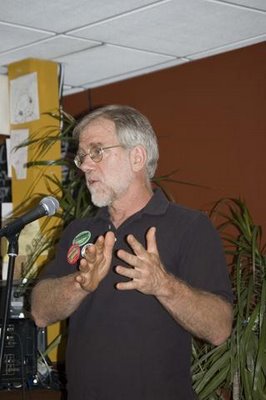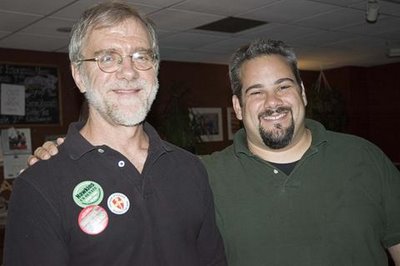
Green Party US Senate candidate Howie Hawkins addresses an audience at the Rock Hill Bakehouse Cafe in Glens Falls, NY
On July 22, New York US Senate candidate Howie Hawkins spoke to a fundraising dinner at the Rock Hill Bakehouse Cafe in Glens Falls. Hawkins is the Green Party's standard bearer who will likely face off against incumbent Democrat Sen. Hillary Clinton. Prior to Hawkins' remarks, visitors were treated to the music of local artist CE Skidmore.
Speaking without notes, Hawkins addressed the crowd for a little more than an hour before engaging in an extensive question and answer session with guests. Hawkins, who is a co-founder of the Green Party of the United States, focused on three main themes: Iraq, energy costs and health care.
As one might expect from a Green candidate, Hawkins opposes the continuing US domination of Iraq. He criticized Democrats for their complicity in getting us into the morass in the first place. He noted that historically, Democrats as a party have benefited from the military-industrial complex as much as Republicans. "Expecting Democrats to get us out of Iraq is like expecting a crack addict to turn in his dealer," he quipped.
He also chastized the anti-war movement for not being sufficiently independent in the wake of the launching of the aggression. The anti-war movement inexplicably threw all its eggs into the basket of pro-war presidential candidate John Kerry and it got them nowhere. He urged anti-war people to not repeat the same mistake with his pro-war opponent, Sen. Clinton. He noted that anti-war Democrats could also vote for Jonathan Tasini, Clinton's opponent in the Democratic primary.
But while Hawkins' opposition to the war was expected, his most lengthy remarks concerned US energy policy. Hawkins called for the creation of a national oil company. This would NOT be a nationalization of current oil companies, but the creation of a new company designed to help protect American consumers against the rapidly escalating price hikes for gasoline.
He said that this company should also be mandated begin at once a NASA-like drive to develop wind, solar, and other alternative sources of power. “It could do this because, unlike the oil companies, this publicly controlled company corporation would have no vested interest in stifling renewable energy sources that compete with Big Oil’s fossil fuel reserves."
Interestingly, he also called for a huge investment project that would develop a modern energy public works infrastructure. He said that money for this could easily be found if we extricated ourselves from the Iraq mess.
He called for transferring $300 billion a year in US military spending and investing it in “a global public works program to rewire the plant for the efficient use of renewable energy in 10 years.” Hawkins has said his clean energy transition will address the problems of global warming, peak oil, job creation, trade deficits, energy costs, and resource wars over oil reserves. “The National Oil Company will serve as yardstick competitor to spur renewable energy development as much as it will for stabilizing oil costs,” Hawkins said.
While the amount might be high considering that the Pentagon's entire budget is apparently $462 billion for the upcoming fiscal year, certainly a large chunk of this money could be found if the military were returned to its sole original purpose of protecting the homeland. Hawkins observed that the US has miltiary bases in over 100 countries.
The fact that there are regular blackouts whenever a big heat waves hits the country shows how vulnerable the country is to energy fluctuations and underlines the needed for improved infrastructure and increased efficiency in energy. Hawkins pooh-poohed the Chicken Little notion that energy conservation would plunge us into third world conditions. He notes that although Europe has a similiar standard of living to our country, its energy consumption is half that of America's.
Finally, Hawkins called for a single payer health care system for the United States. He noted that in 1993, Clinton specifically rejected the idea in 1993. Then, she proposed a complicated series of government regulations rather than the more straight forward system used by most developed countries.
Hawkins said that far from having to re-invent the wheel, the basic infrastructure for single payer is already there: Medicare. All that needs to be done is to amend present Medicare legislation to have it apply to all citizens. It would be private health care with public funding.
He pointed out that contrary to popular assumptions, single payer would be far more efficient than the current system. Bureaucratic overhead for the government Medicare system is only 3 percent while bureaucratic overhead for private insurers is ten times higher: a staggering 30 percent!
This blogger, who was recently hospitalized and had his first major foray into the health care system, can attest to the current system's maddeningly byzantine inefficiencies, redundancies and waste.
The US spends more per capita (15.5 percent of GDP) on health care than any other country amd almost double the next highest country. The World Health Organization rates the US health care system 37th in the world in overall performance.
[...]
Physicians for a National Health Program estimates that the US would save over $286 billion annually on overall health care expenditures under a Medicare For All plan while extending coverage to all.
Hawkins echoed a common theme of smaller party candidates in criticizing the corporate control of the two major parties. While there are individual Democrats and Republicans of conscience, he implied that the two major parties were marked essentially by a distinction without a difference. They agree on the big issues of militarism, corporatism and hostility toward the working class, differing primarily in degree. They blow up relatively smaller issues (guns, God and gays) to mask these basic similarities. He noted that it was Bill Clinton who got through much of the GOP agenda, such as anti-gay marriage legislation, evisceration of welfare protections and the wholesale deregulation of the telecommunications industry.
One audience member asked Hawkins if he was mainstream enough to win. He replied that his positions were very mainstream in New York state, which is largely anti-war and has a large number of un- and under-insured. His main concern, like that of most smaller party candidates, was whether his message would be covered in anything other than a token way by the corporate media.
All in all, audience members seemed happy that a progressive choice for Senate was going to appear on New York's ballot in November.
Note: Hawkins will the subject of the upcoming episode of the WAMC/Northeast Public Radio program The Capitol Connection. The episode will air on a few NEPR stations and via online streaming on Friday Aug. 4 at 8:30 PM. (Check WAMC's schedule for specifics). It will air throughout the network on Saturday Aug. 5 at 1:00 PM.
Update: The archive of the interview can be found here.

Hawkins with Rock Hill owner and local activist Matt Funiciello. (photos courtesy of David Doonan)
No comments:
Post a Comment